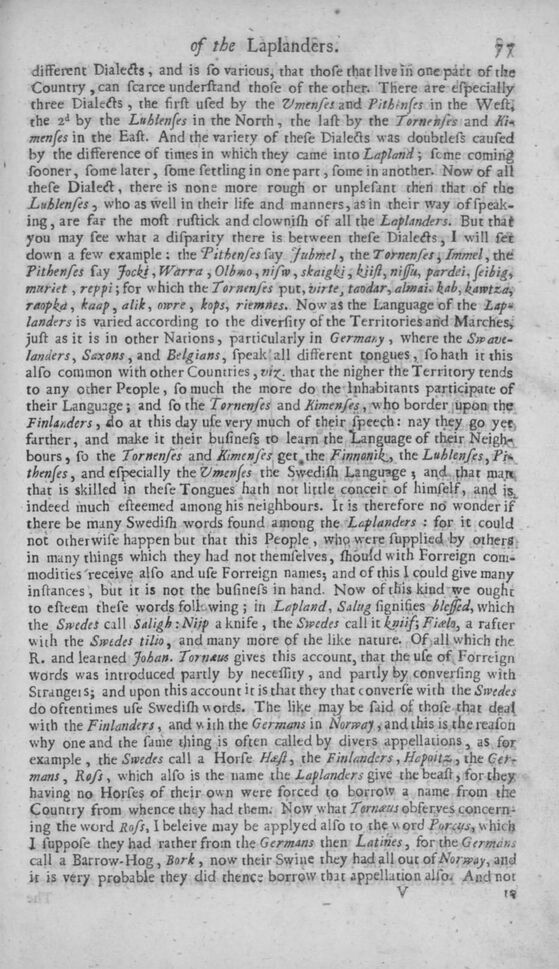
Full resolution (JPEG) - On this page / på denna sida - Sidor ...

<< prev. page << föreg. sida << >> nästa sida >> next page >>
Below is the raw OCR text
from the above scanned image.
Do you see an error? Proofread the page now!
Här nedan syns maskintolkade texten från faksimilbilden ovan.
Ser du något fel? Korrekturläs sidan nu!
This page has never been proofread. / Denna sida har aldrig korrekturlästs.
Of the Laplanders. , ^ n
different Dialeds, and is fo various, that thoSe that live in one par t of the
Country, can fcarce understand thofe of the other. There are especially
three Dialtfts , the first ufed by the Vmenfes and Pitbtnfes in the Weft,
the 2J by the Lublenfes in the North, the laft by the Tornenfes and Ki*.
menfes in the East. And the variety of thefe Dialefts was doubtleSs cauSed
by the difference of times in which they came into Lapland; Seme coming
Sooner, Some later, Some Settling in one part, Some in another. Now of all
thefe Dialed, there is none more rough or unplefant then that of the
Lublenfes, who as well in their life and manners, as in their way
offpeak-ing, are far the moft ruftick and clownilh of all the Laplanders. But that
you may fee what a disparity there is between theSe Dialeds, I will Set
down a few example ; the Titbenfes Say fubmel, the Tornenfes, Immel, the
Pithenfes fay Jockj, Wirra , Olbmo, nifw, skaigkj, kjift, nifu., pardii, feibig,
mitriet , reppi; for which the Tornenfes put,’virte, taodar, ahnti. kab,kawtza,
raopka, kaap, alik, wr re, kops, riemnes. Now as the Language of the
Laplanders is varied according to the diversity of the Territories and Marches,
juft as it is in other Nations, particularly in Germar.y , where the
Swave-landers, Saxons, and Belgians, fpeak all different tongues, fohath it this
alfo common with other Countries, vthat the nigher the Territory tends
to any other People, fo much the more do the Inhabitants participate of
their Language ; and fo the Tornenfes and Kimenfes, who border upon the
Finla/.ders, <lo at this day ufe very much of their Speech: nay they go yet,
farther, and make it their bufineSs to learn the Language oS their
Neighbours, fo the Tornenfes and Kimenfes get.the Finnon’ik.., the Lublenfes, Pi-,
thenfes, and efpecially thcZhnenfes the SwediSh Language ; and that mail
that is skilled in thefe Tongues hath not little conceit of himfelf, and is,,
indeed much esteemed among his neighbours. It is thereSore no wonder if
there be many SwediSh words found among the Laplanders : for it could
not otherwife happen but that this People , who were fupplied by others
in many things which they had not themlelves, Shouid with Forreign
commodities’receive alSo and ufe Forreign names; and of this 1 could give many
inftances, but it is not the bufinefs in hand. Now of this kind we ought
to efteem thefe words following ; in Lapland, Salug fignilies blcffed, which
the Swedes call Saligh : Nilp a knife, the Swedes call it kpiif, F’utlt, a rafter
with the Swedes tiho, and many more of the like nature. Of all which the.
R. and learned Johan. Tortuus gives this account, that the ufe of Forreign
Words was introduced partly by necellity, and partly by converfing with
Strangets; and upon this account it is that they that converfe with the Swedes
do oftentimes ufe Swedifh words. The like may be faid of thofe that dpal
with the Finlanders, and with the Germans in Norway, and this is thereaSon
why one and the fame thing is often called by divers appellations , as for
example, the Swedes call a Horfe Haft, the Finlanders, Hapoitx,, the
Germans , Rofs, which alfo is the name the Laplanders give the beast, for they
having no Horfes of their own were forced to borrow a name from the
Country from whence thty had them. Now what Torna-us obfer.ves concern•
ing the word Rofs, I beleive may be applyed alfo to the word Puni/s, which
I fuppofe they had rather from the Germans then Latines, forth e Germans
call a Barrow-Hog, Bork , now their Swine they had all out of Norway, and
it is very probable they did thence borrow that appellation alfo. And not
<< prev. page << föreg. sida << >> nästa sida >> next page >>